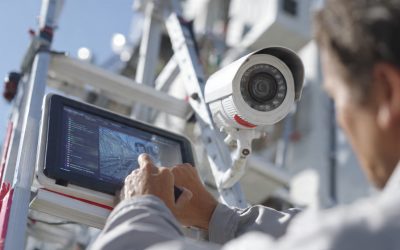Understanding Commercial Security Systems
In today’s rapidly evolving business landscape, commercial security systems have become a paramount concern for organisations of all sizes. Comprehensive business security solutions, designed specifically for businesses, are essential for safeguarding assets and ensuring the safety of employees and customers. With the rise of cyber threats, physical security breaches, and insider risks, understanding the vulnerabilities within a business is crucial. Implementing a robust business security system is vital for protecting various aspects of a business, such as its people, property, and assets. This article delves into common commercial security mistakes that can leave businesses exposed and offers insights on how to mitigate these risks.
What is Business Security?
Business security refers to the comprehensive measures and systems designed to protect businesses, their assets, and employees from various security threats. This encompasses a wide range of solutions, including advanced security systems, alarm systems, access control mechanisms, and video surveillance. Effective business security is crucial for preventing losses, safeguarding vital equipment, and ensuring the safety of both employees and customers. A robust security system not only provides peace of mind for business owners but also acts as a deterrent against theft, vandalism, and other potential security threats. By investing in high-quality security systems, businesses can create a secure environment that supports their operations and growth.
The Importance of Security Awareness
Security awareness is the foundation of any robust security strategy. Employees are often the first line of defence against potential threats. However, a lack of awareness can lead to unintentional security breaches. Regular training sessions on recognising phishing attempts, understanding password protocols, and reporting suspicious activity can significantly reduce vulnerabilities.
Moreover, fostering a culture of security within the workplace encourages employees to take ownership of their roles in protecting company assets. When staff members are informed and vigilant, they contribute to a more secure environment. This culture can be further enhanced by implementing a reward system that acknowledges employees who demonstrate exemplary security practices, thereby motivating others to follow suit. Additionally, incorporating real-life scenarios into training can help employees better understand the potential consequences of security breaches, making the training more relatable and impactful.
Physical Security Measures
While digital threats are prevalent, physical security should not be overlooked. An alarm system is crucial in providing immediate alerts during security breaches, fires, or emergencies. Many businesses neglect to secure their premises adequately, leaving them vulnerable to theft, vandalism, or unauthorised access. Implementing measures such as surveillance cameras, access control systems, and security personnel can deter potential threats.
Additionally, regular audits of physical security measures can help identify weaknesses. For instance, ensuring that all entry points are secure and that there are no blind spots in surveillance coverage is essential for safeguarding assets. It is also vital to consider the layout of the premises; strategic placement of security devices, including fire alarms, can enhance visibility and deter criminal activity. Furthermore, engaging with local law enforcement to establish a rapport can provide businesses with additional resources and support in the event of a security incident, creating a more comprehensive approach to safeguarding the organisation.
Towards this end, integrating physical security solutions with building management systems can streamline operations, automate responses to security breaches, and enhance overall efficiency in managing commercial properties.
Common Security Mistakes
Identifying common security mistakes is the first step in mitigating risks. Many businesses unknowingly engage in practices that can leave them exposed to threats. Below are some of the most prevalent security oversights.
Insufficient Security Equipment
One of the most common mistakes is not investing in adequate security equipment. A security alarm is a crucial component of comprehensive commercial security systems designed to protect businesses from various threats, including theft and unauthorised access. Modern alarm systems integrate with video surveillance and access control systems to enhance overall security functionality and provide immediate alerts in case of security breaches. Additionally, customisable business alarm systems that offer 24/7 security monitoring and immediate in-person responses are essential. These systems can be tailored to a business’s unique layout, combining both wired and wireless solutions for optimal security coverage.
Neglecting Software Updates
Outdated software is a significant vulnerability that many businesses overlook. Software developers regularly release updates to address security flaws and improve functionality. Failing to install these updates can leave systems open to exploitation by cybercriminals.
Establishing a routine for software updates, including operating systems, applications, and security software, is essential. Automating this process can ensure that updates are applied promptly, reducing the risk of security breaches. Furthermore, businesses should maintain an inventory of all software in use, as this will help identify which applications require updates and ensure that no critical software is left unmonitored. Regularly reviewing software usage can also help in phasing out outdated or unsupported applications that may pose additional risks.
Weak Password Practices
Passwords are often the first line of defence against unauthorised access. However, many businesses still rely on weak password practices, such as using easily guessable passwords or reusing passwords across multiple accounts. This negligence can lead to significant security breaches.
Implementing a strong password policy is vital. Encouraging the use of complex passwords, enabling multi-factor authentication, and regularly prompting employees to change their passwords can greatly enhance security. Additionally, providing training on creating secure passwords can empower employees to take their security seriously. It is also beneficial to introduce a password manager that can help employees generate and store unique passwords securely, thereby reducing the temptation to revert to simpler, less secure options.
Inadequate Data Protection
Data is one of the most valuable assets for any business. Inadequate data protection measures can lead to significant financial and reputation damage. Many businesses fail to encrypt sensitive data, leaving it vulnerable to interception during transmission or storage.
Implementing data encryption, both at rest and in transit, is a crucial step in protecting sensitive information. Furthermore, establishing clear data handling policies and conducting regular audits can help ensure compliance with data protection regulations and safeguard against breaches. It is also important to educate staff about the significance of data protection, as human error can often be a weak link in security. Training sessions that cover the importance of data privacy, recognising phishing attempts, and the proper handling of sensitive information can create a more security-conscious culture within the organisation. Additionally, employing access controls to limit data access to only those who need it can further enhance protection against potential threats.
Lack of Professional Monitoring
A lack of professional monitoring can leave businesses significantly vulnerable to security threats. Without a dedicated team of trained agents to respond to alerts from the security system, businesses may not receive timely assistance during an intrusion or other security incidents. It’s important to choose the right security monitoring service for your business type. Professional monitoring offers a cost-effective alternative to on-site security personnel, providing an added layer of protection. By investing in professional monitoring services, businesses can ensure that their security system is continuously monitored and that any alerts are promptly addressed, even when the premises are unoccupied. This continuous oversight helps in mitigating risks and ensuring a swift response to any security breaches, thereby enhancing the overall security posture of the business. Consider back-to-base monitoring for a 24/7 solution.
Inadequate Access Control
Inadequate access control can severely compromise the security of a business. Without proper measures in place, unauthorised individuals may gain access to sensitive areas or equipment, posing significant risks. Access control systems are designed to restrict entry to authorised personnel only, thereby preventing unauthorised access. By implementing a robust access control system, businesses can ensure that only individuals with the necessary permissions can enter specific areas, reducing the risk of theft, vandalism, and other security threats. Effective access control not only protects physical assets but also helps in maintaining the integrity of sensitive information and critical operations.
Insufficient Security Equipment
Insufficient security equipment can leave businesses exposed to various security threats. Without the right tools, businesses may struggle to detect or respond to security incidents effectively. Essential security equipment, such as security cameras and alarm systems, plays a crucial role in detecting and deterring potential threats. By investing in comprehensive security equipment, businesses can ensure they have the necessary tools to protect their assets and employees. High-quality alarm systems can alert authorities to potential breaches, while security cameras provide valuable surveillance footage that can be used to monitor activities and investigate incidents. Ensuring that the business is equipped with adequate security tools is a fundamental step in creating a secure environment.
Addressing Insider Threats
While external threats are often the focus of security strategies, insider threats can be equally damaging. Employees, whether maliciously or inadvertently, can compromise security. Understanding how to address these risks is essential for any business.
Monitoring User Activity
Monitoring user activity can provide valuable insights into potential insider threats. Implementing user behaviour analytics can help identify unusual patterns that may indicate malicious intent or negligence. For instance, if an employee accesses sensitive information outside of their normal activities, it may warrant further investigation.
However, it is crucial to balance monitoring with respect for employee privacy. Establishing clear policies regarding monitoring practices can help maintain trust while ensuring security.
Conducting Background Checks
Before hiring new employees, conducting thorough background checks can help mitigate the risk of insider threats. This process can reveal any previous criminal activity or red flags that may indicate potential security risks. While it may not eliminate all risks, it is a proactive step in safeguarding the organisation.
Additionally, fostering a positive workplace culture can reduce the likelihood of insider threats. Employees who feel valued and engaged are less likely to engage in harmful behaviours.
Developing a Comprehensive Security Strategy
A comprehensive security strategy encompasses various elements, from physical security measures to cybersecurity protocols. Business security systems are designed to protect businesses, assets, and employees from security threats, offering features such as video surveillance, access control, and AI-driven analytics. Developing a holistic approach can significantly enhance a business’s resilience against threats. Customising a security solution to fit the unique challenges of different types of businesses is crucial for effective security management.
Conducting Risk Assessments
Regular risk assessments are essential for identifying vulnerabilities within a business. These assessments should evaluate both physical and digital security measures, as well as employee practices. By understanding potential risks, businesses can implement targeted strategies to mitigate them.
Engaging with security professionals or consultants can provide valuable insights during the assessment process. They can help identify weaknesses that may not be immediately apparent and recommend appropriate solutions.
Creating an Incident Response Plan
No security strategy is complete without an incident response plan. This plan outlines the steps to be taken in the event of a security breach, ensuring a swift and effective response. It should include clear roles and responsibilities, communication protocols, and procedures for containing and mitigating the impact of the breach.
Regularly reviewing and updating the incident response plan is crucial, as threats and technologies evolve. Conducting drills and simulations can also prepare employees to respond effectively in real-world scenarios.
Investing in Security Technology
Investing in the right commercial security systems can significantly enhance a business’s security posture. Business alarm systems that provide 24/7 monitoring and immediate in-person responses are crucial for comprehensive security. From advanced surveillance systems to cybersecurity solutions, the right tools can provide an added layer of protection. Choosing a reliable security company is essential to ensure you get the best security solutions tailored to your needs.
Professional commercial security installation plays a vital role in ensuring effective security system setup, with expert technicians assessing specific needs and ensuring optimal placement of devices and sensors.
Choosing the Right Business Security Solutions
When selecting security solutions, businesses should consider their specific needs and vulnerabilities. For instance, a company with a large amount of sensitive data may require robust data encryption and cybersecurity measures, while a retail business may prioritize physical security systems. Tailored security solutions for small businesses are crucial as they cater to unique challenges and budget considerations, ensuring effective and affordable protection.
Consulting with security experts can help businesses identify the most suitable solutions for their unique circumstances. Additionally, staying informed about the latest security technologies, including various home security systems and their features, can ensure that businesses remain ahead of emerging threats.
Regularly Reviewing Security Measures
Security is not a one-time effort; it requires ongoing attention and adaptation. Regularly reviewing security measures can help businesses stay ahead of potential threats. This includes evaluating the effectiveness of existing security solutions, conducting penetration testing, and staying informed about the latest security trends.
By fostering a proactive approach to security, businesses can create a resilient environment that is better equipped to withstand threats.
Integrating Video for Sustainability
Integrating video surveillance with other security systems is an important aspect of modern business security, offering both enhanced protection and sustainability benefits. By combining video surveillance with other security measures, businesses can improve their overall security posture while also reducing their environmental impact. Video surveillance systems can help reduce energy consumption and waste by providing real-time monitoring and alerts, allowing businesses to respond quickly to security incidents and minimise the need for physical patrols. This integration not only enhances security but also supports sustainability goals by reducing the carbon footprint associated with traditional security methods. By adopting integrated video solutions, businesses can achieve a balance between robust security and environmental responsibility.
Conclusion
In an increasingly complex security landscape, understanding and addressing common commercial security mistakes is essential for any business. By fostering a culture of security awareness, implementing robust measures, and investing in the right commercial security systems, organisations can significantly reduce their vulnerabilities.
Ultimately, security should be viewed as an ongoing commitment rather than a one-time task. By prioritising security and continuously adapting to new threats, businesses can protect their assets, reputation, and future growth. It is imperative to take these steps seriously, as the cost of neglecting security can far outweigh the investments made in safeguarding the organisation.










